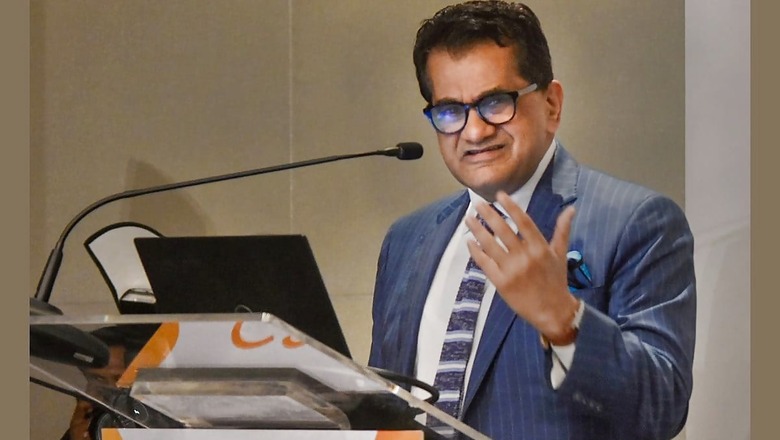
views
Ahead of the G20 Summit in New Delhi from September 8-10, Sherpa Amitabh Kant told News18 exclusively that for the “past 20 days, negotiations are on from 2pm to 2am".
“Every negotiation is like walking a tightrope, every word is contested. Every word is fought for, but we do it with positivity and optimism," he said.
Commenting on his role, Kant said, “Sherpa is a Nepali world for someone who takes the leader to the peak of Mount Everest. My work is to assist Prime Minister Narendra Modi reach the peak."
Russia and China have objected to the use of the word ‘war’ in paras 3 and 4 of the G20 Bali Leaders’ Declaration, 2022. The para four of the declaration states India’s stance on the war, which calls for a diplomatic resolution and underlines that this is not “an era of war". The representative of Russia said it is conducting a “military operation" to “de-Nazify" Ukraine.
Reacting to it, Kant said, “War is not our creation. The developing world has nothing to do with it. We have put forth a developmental agenda."
Edited excerpts:
Foreign policy has largely been seen as a sophisticated subject. Prime Minister Narendra Modi wants “janbhagidari wala G20", how does that make the event different?
G20s are usually held in one or two cities. G20 is not like a cricket or football World Cup. The Prime Minister felt G20 should be people’s presidency, full of janbhagidari (people’s participation). He asked us to take it to every state of the country. We have taken G20 to every state, almost 60 cities of India. It has improved the infrastructure of cities, drainage, etc. Secondly, we took it to every school and college of India, every child of India. Students wrote essays, held debates and even participated in mock G20 meets. This is a people’s movement in India. Civil 20, Youth 20 and Business 20 had people’s involvement.
We have been hearing about the term Sherpa in the context of G20 meets. Could you elaborate on the exact role and responsibilities of a Sherpa?
Sherpa is a Nepali world for a trusted guide who takes the leader to the peak of Mount Everest. Every country has a Sherpa, who is supposed to be the assistant to his leader. My efforts are to assist my leader, the PM of India, to reach the peak. Our attempt has been on the content side to make it inclusive, decisive, ambitious and action-oriented. My job is to work on the ambitious agenda, work with 20+9 invited countries and 43 international organisations to ensure a consensus. Different countries are at different stages of development and they have different national ambitions and goals. Bringing everybody together is the most difficult task. So far, India has been able to push forward the ambitious agenda.
My job is to work on the ambitious agenda, work with 20+9 invited countries and 43 international organisations to ensure a consensus. Different countries are at different stages of development and they have different national ambitions and goals. Bringing everybody together is the most difficult task.
What is the importance of G20 Secretariat? How many members work there? What are their roles?
There are huge negotiations behind every ministerial level meet. There are four rounds of negotiations. When we prepare for the meetings, there are two tracks — Sherpa and finance. There are 13 tracks on the Sherpa level and eight in finance. In addition, 11 engagement groups work to mobilise civil society. There are working groups with different ministries and their inputs come to the Sherpas. We work in partnership with various ministries. Our officers collaborate with them. Those inputs and documents have come to the Sherpa track and we are now negotiating from 2pm to 2am. It is a complex, but an interesting job. For the past 20 days, we are negotiating on every word. Every word is fought for.
The B20 Summit echoes the PM's words: the future of global growth is dependent upon the future of business. As businesses evolve beyond borders, their role in driving progress is paramount. Together, we can turn challenges into opportunities and drive progress for all. pic.twitter.com/0GfijhAQwA— Amitabh Kant (@amitabhk87) August 27, 2023
India is positioning itself as a leader of the global south. What does the term stand for and how is India helping these countries by raising their concerns?
When the presidency started, the PM had a meeting with the leaders of 125 countries of the global south. When we say the global south, it means all developing countries, from emerging to less developed countries, we heard them out. Their priorities are our priorities. Not just growth, it is about strong, sustainable and balanced inclusive growth. Education, health, literacy and nutrition are very important. They are about climate action and climate finance because the developed world has to provide finance as the developing countries are worst affected by the climate change. Then there is reform and redesign of multilateral financial institutions, as they came up after the second world war when the crisis of climate and Sustainable Development Goals (SDG) was not there. You need at least $5-trillion-dollar resources. There is no shortage of funds, but we need assistance to mobilise them through new instruments such as blended finance and credit enhancement. Then, technological advancement and digital public infrastructure. How to use the model of digital public infrastructure to lift people above the poverty line so that they get digital identity, or are able to do fast payments and use it for other purposes such as health and education? Lastly, the PM’s priority of women-led development. One study by the World Economic Forum said that it takes 132 years to bring gender parity. We cannot wait for so long, we want to do it in the next decade.
One country objected to the motto of ‘Vasudhaiva Kutumbakam (One Earth, One Family, One Future)’. How will we build consensus to it?
Our motto is Vasudhaiva Kutumbakam. We have done our presidency under the ‘One Earth, One Family, One Future’ motto. We will convince everybody to take it forward.
A great way to highlight the message of Vasudhaiva Kutumbakam and that too from the eternal city of Kashi! https://t.co/DpeyEKefnO— Narendra Modi (@narendramodi) August 27, 2023
China says it is taken from Sanskrit, which is not the official language…
They may say that, but it is the job of the Sherpa to convince them. We are still negotiating. We are quite hopeful that our motto will find a place during our presidency.
China and Russia have objected to paras 3 and 4. Can we expect a joint communique in the leaders’ meet?
Paras 3 and 4 of the G20 Bali Leaders’ Declaration, 2022 in Bali were because of the war. Our presidency is ambitious. War is not our creation. India has nothing to do with it. Developing countries have nothing to do with it. India’s presidency took a conscious call that we will put ahead the developmental agenda. We will raise issues of women-led development, SDGs, technology development and sustainable growth. All of PM’s addresses are on the agenda of development.
How are the negotiations with other members going?
All negotiations are like walking a tightrope, but we have to do it with positivity, optimism and in a balanced manner. We have done everything in good faith.
How do you look at the inclusion of the African Union?
The Prime Minister wrote to every leader. I am sure the African Union will become an integral part of G20, as we want our presidency to be inclusive and their voice will be added to G20. G20 will get more strength as almost all leaders have supported it. You will get to know at the end of the summit.




















Comments
0 comment